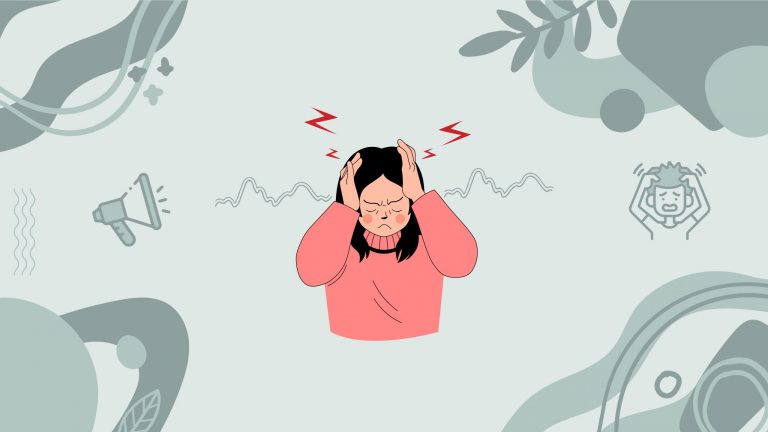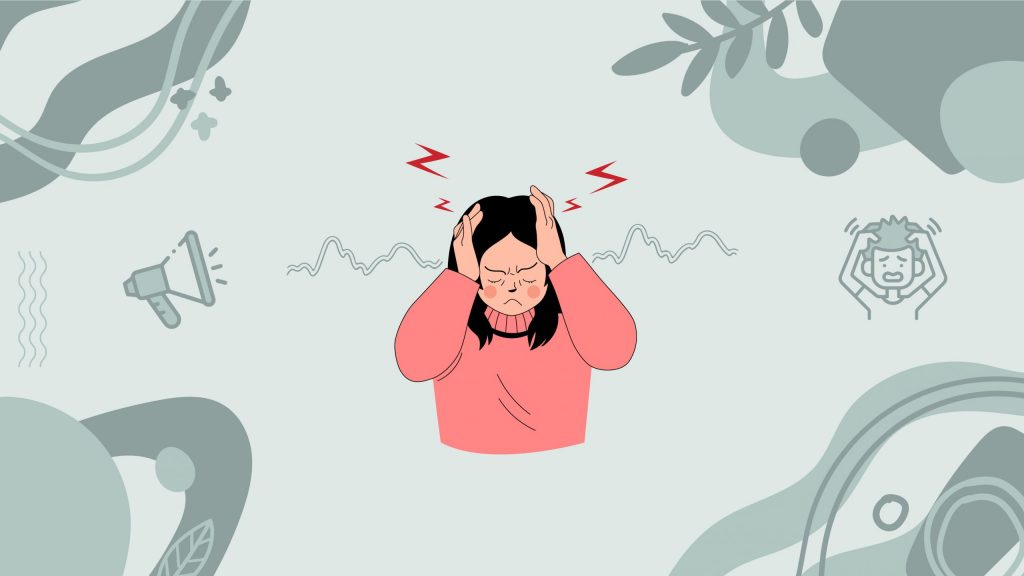Have you ever felt like the world is just too loud? Imagine every day sounds like a ticking clock or the buzz of a refrigerator becoming unbearable. This overwhelming sensitivity to noise is known as hyperacusis.
For those affected, normal sounds can turn into painful experiences, making daily life a constant challenge. Let’s explore hyperacusis, why it happens, and how to manage it effectively.
Daily Struggle of Hyperacusis
Imagine a world where everyday sounds that most people find normal or even pleasant are painfully loud and unbearable. Noises like the refrigerator’s hum, the rustle of leaves, or even a friend’s laughter become torturous. This is the reality for those living with hyperacusis, a condition where normal environmental sounds feel overwhelmingly loud.
For individuals with hyperacusis, navigating daily life can be a relentless challenge, affecting their work, social interactions, and overall well-being.
Hyperacusis can make ordinary activities daunting. A simple visit to the grocery store becomes an ordeal, with the clattering of carts and beeping of checkout scanners causing significant discomfort. Social gatherings are often avoided because the noise of conversations and background music is overwhelming.
This constant need to shield oneself from noise can lead to isolation and anxiety, further complicating the struggle. For those with hyperacusis, the world is a minefield of sound, making each day challenging to endure.
The Neuroscience of Sound Sensitivity
Hyperacusis is when the brain’s auditory processing system becomes overly sensitive to sounds. This means that everyday noises, which are usually filtered and moderated by our auditory system, are perceived as excessively loud.
Various factors can lead to hyperacusis, including prolonged exposure to loud noises, head injuries, certain medications, and underlying health issues such as migraines or Lyme disease. When the auditory system malfunctions, it fails to filter and regulate sound intensity properly, making moderate sounds seem painfully loud.
Neurological Underpinnings
On a neurological level, hyperacusis involves abnormal functioning of the auditory pathways and brain regions responsible for processing sound. The auditory nerve, which carries sound signals from the ear to the brain, may become hyperactive, sending excessive signals.
Additionally, the brain’s limbic system, which controls emotions, can overreact to sound stimuli. This heightened activity in both the auditory nerve and the limbic system amplifies the perception of noise, making even mild sounds intolerable.
Combining these factors creates a feedback loop where sound becomes not just a sensory experience but an emotional and physical ordeal. Understanding this helps develop strategies to manage and mitigate the effects of hyperacusis.
Subscribe to newsletter
Get your Gut Health Starter Guide right now.
Elevate your Tuesdays with practical, science-backed wisdom propelling you forward on your gut health journey.

Practical Solutions for Living with Hyperacusis
Living with hyperacusis means finding ways to manage and reduce your exposure to sound. Here are some practical strategies to help you cope:
- Create a Quiet Space: Designate a specific room in your home as a quiet retreat. Use soft furnishings like carpets, curtains, and cushions to absorb sound and reduce noise levels. This space will serve as a sanctuary when noise becomes overwhelming.
- Sound Therapy: Gradually exposing yourself to low-level sounds can help desensitize your auditory system. This process, known as sound therapy, should be done under the guidance of an audiologist. It involves listening to soft, non-threatening sounds and slowly increasing their volume over time.
- Relaxation Techniques: Practice relaxation methods such as deep breathing, meditation, or progressive muscle relaxation. These techniques can reduce anxiety and stress, which often exacerbate hyperacusis symptoms.
- Seek Professional Help: Consult with an audiologist or an otolaryngologist (ENT specialist) for a comprehensive evaluation and personalized treatment plan. Cognitive-behavioral therapy (CBT) can also be beneficial in addressing the emotional aspects of hyperacusis, helping you manage your reactions to sound more effectively.
Building Positive Habits
Consistency is crucial in managing hyperacusis. Incorporate these strategies into your daily routine to build resilience and improve your quality of life:
- Regular Sound Exposure: Gradually increase your exposure to different sounds. Start with low-level noises and slowly progress to more challenging environments. This helps retrain your auditory system to handle sounds better.
- Mindfulness Practices: Engage in mindfulness practices to stay present and reduce anxiety. Mindfulness can help you develop a healthier relationship with sound, making it less distressing.
- Healthy Lifestyle: Maintain a balanced lifestyle by getting enough sleep, eating nutritious meals, and exercising regularly. Good overall health positively impacts your auditory system and can help mitigate hyperacusis symptoms.
By consistently applying these strategies, you can better manage hyperacusis and improve your ability to cope with everyday sounds. Over time, these practices can lead to a more comfortable and fulfilling life despite the challenges posed by hyperacusis.
Triumph Over Sound
Sarah, a 34-year-old graphic designer, faced a life-altering challenge when she was diagnosed with hyperacusis following a severe ear infection. This condition made her once manageable life intolerable.
Sounds that others found normal became excruciatingly loud for Sarah. Due to the constant noise, working in her open-plan office was impossible, and social events turned into sources of dread. She began withdrawing from activities she once loved, feeling isolated and frustrated.
Determined not to let hyperacusis control her life, Sarah sought help from an audiologist who recommended sound therapy. This therapy involved daily sessions of low-level background noise, with the volume gradually increasing over several months.
Sarah also embraced mindfulness and relaxation techniques to manage her anxiety, which often intensified her sensitivity to sound.
The journey took a lot of work. There were days when Sarah felt overwhelmed and tempted to give up. However, her perseverance paid off. Over time, she noticed a significant improvement in her tolerance to everyday sounds. For particularly loud days, she could return to her office with noise-canceling headphones. Social events became manageable, and she no longer needed to isolate herself.
Sarah’s quality of life improved dramatically. She learned to navigate her condition with confidence and resilience, transforming her daily struggle into a manageable part of her life.
Sarah’s story is a powerful testament to the importance of persistence and the effectiveness of tailored strategies in managing hyperacusis. Her experience shows that with the proper support and strategy, it is possible to reclaim your life from the grips of hyperacusis.
Living with hyperacusis can be daunting, but understanding the condition and implementing practical strategies can make a significant difference. By protecting your ears, creating quiet spaces, engaging in sound therapy, and seeking professional help, you can improve your tolerance to sound and reclaim your life.
Remember, you are not alone in this journey—support and solutions are available to help you navigate the challenges of hyperacusis. Sarah’s journey shows that with determination and the right approach, you can triumph over the sound and live a fulfilling life.


















